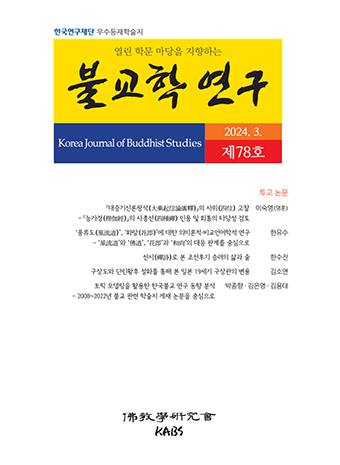Abstract
References
Sorry, not available.
Click the PDF button.
Information
Resently a new article is presented by a Japanese Kitskawa Tomoaki(橘川智昭) which insists that Wonchuk(圓測)'s view is completely equal to Fa-Xiang School(法相宗)’s theory of five distinct human natures(五性各別說). His argument is oposite undoubtedly to the already established understanding about Wonchuk's thought.In this paper the author tries to investigate this argument and clarify Wonchuk's standpoint about the possibility of becoming the Buddha in every sentient being. At first I made clear that his two starting points have no solid foundation. Then I reinvestigate his analysis about the sentenses in which two oposite opinions are referred. In this place I confirmed that Wonchuk is interpreting two opinions impatially. He makes an effort to explain the context and the function of each opinion. He does not insist absolutely that the one is correct and the other is false. Wonchuk shows deeper interest to sentient beings and has an exceedingly hopeful viewpoint that all sentient beings have many infinitive possibilities. This attitude is consistent in all his books. In conclusion I can say that Wonchuk does not agree in any sense with Fa-Xiang School's theory of five distinct human natures.
Click the PDF button.
- Publisher :Korean Association of Buddhist Studies
- Publisher(Ko) :불교학연구회
- Journal Title :Korea Journal of Buddhist Studies
- Journal Title(Ko) :불교학연구
- Volume : 5
- No :0
- Pages :157~180


 Korea Journal of Buddhist Studies
Korea Journal of Buddhist Studies






